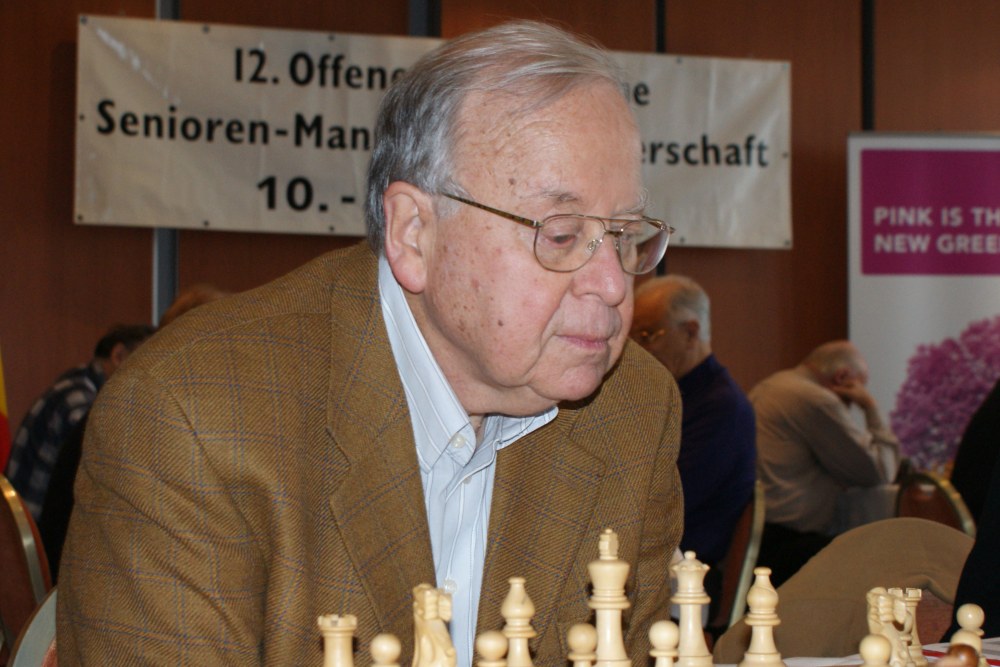


ChessBase 17 - Mega package - Edition 2024
It is the program of choice for anyone who loves the game and wants to know more about it. Start your personal success story with ChessBase and enjoy the game even more.
Originally published in German on March 29, 2020
He is a chess legend and a witness of the chess world during the second half of the twentieth century. Grandmaster Wolfgang Uhlmann from Dresden, who celebrates his 85th birthday on 29 March, faced a total of ten world champions and managed to defeat five of them: Mikhail Botvinnik, Vasily Smyslov, Bobby Fischer, Viswanathan Anand and Alexander Khalifman.
In 1951 Wolfgang Uhlmann became the German junior champion in Leipzig. Three years later he won the GDR Championship in Meerane at the age of 18. Ten further titles followed until 1986. From the mid-1950s Wolfgang Uhlmann was the number one player in the German Democratic Republic and occupied the top board of the national team for a very long time. After his successes in Hastings, at the oldest chess tournament in the world, he was awarded the title of grandmaster by the World Chess Federation in 1959. He took part in eleven Olympiads, from Moscow 1956 to Novi Sad 1990. In 1971 in Las Palmas, as a World Championship candidate, he lost to none other than Bent Larsen by a 3½:5½ score.
Today Wolfgang Uhlmann can look back on a successful career spanning almost seven decades, a unique feat in the sport. Uhlmann also won World and European Championship titles with the German national team.
Victor Kortchnoi, two-times contender for the world championship, is a piece of living chess history. He is known as one of the greatest fighters in the history of chess. On this DVD he speaks about his life and shows his game.
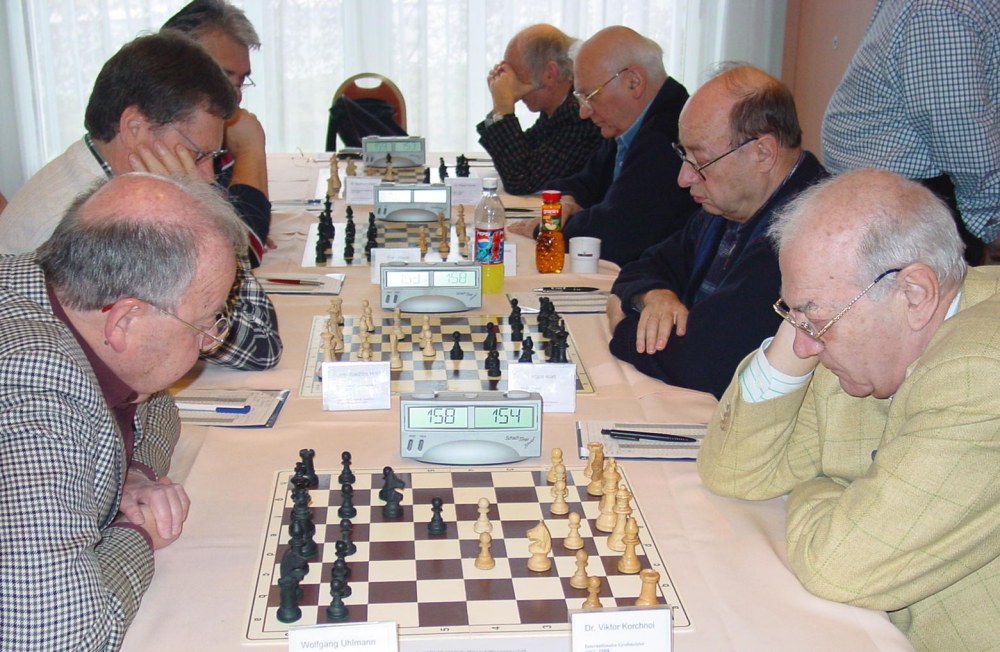
Chess legends Wolfgang Uhlmann and Viktor Korchnoi
As the oldest Bundesliga player of all time, he played his last game in the top division of the League in April 2016 at the age of 81. The very last competitive game of the Dresdener can be found in MegaBase 2020, an encounter that was played on 24 March 2019.
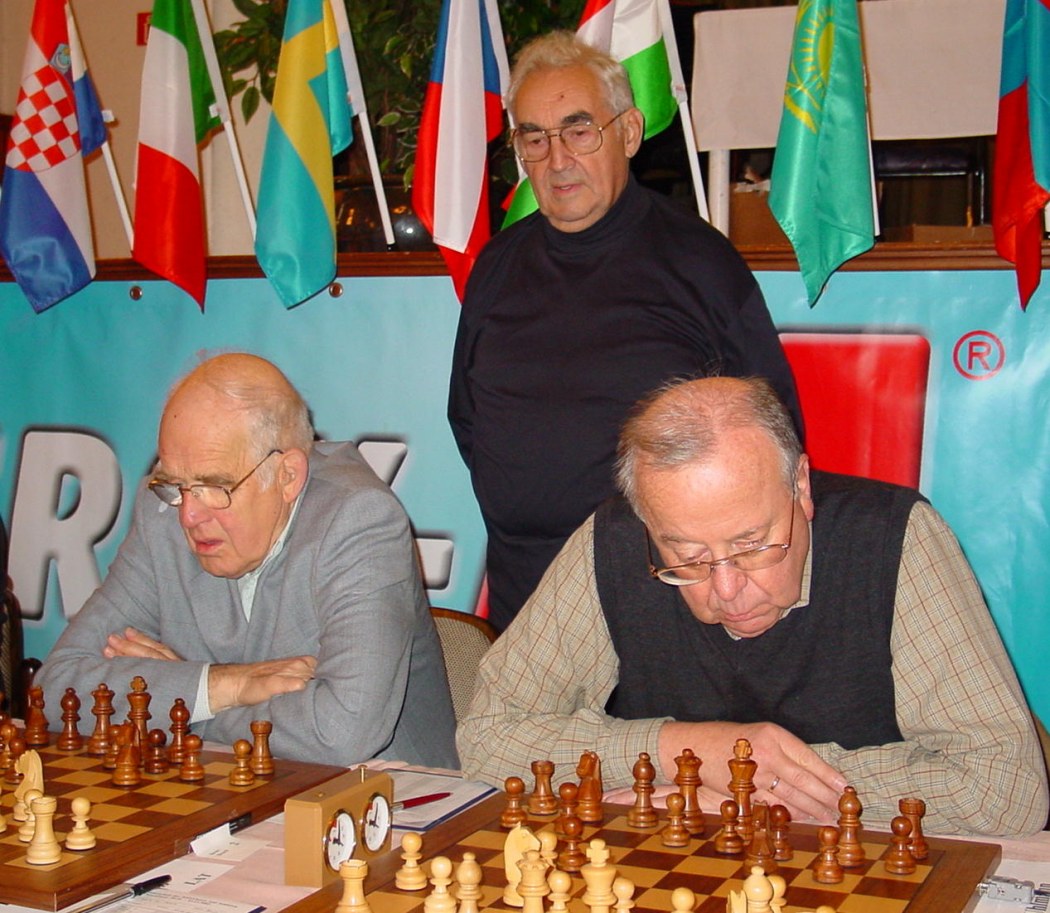
Wolfgang Unzicker, Mark Taimanov and Wolfgang Uhlmann
The veteran still follows international chess events closely and enjoys the magnificent moves of today’s top players. Wolfgang Uhlmann attests to Carlsen & co’s amazing skill, but also warns that in view of the influence of computers, the artistic component of chess should not be neglected. In his opinion, the appeal of our game lives primarily from well-played games. This should not be forgotten. Wolfgang Uhlmann still uses this approach with the one chess student he continues to train.
Good afternoon, Wolfgang, I hope your wife and you are doing well.
Yes, given the circumstances, we are. We are shocked at the moment and experiencing how the world is affected by this terrible corona invasion.
On this occasion I would like to talk to you first about the topic of illness. Basically, you owe your chess career to a stay in the hospital...
Right. As a child I had tuberculosis, fortunately not the active type. I was ten years old and was in the hospital for a very long time. So, shortly after the end of the Second World War, there were no medicines for this disease at all. The disease was only cured by lying down and eating. In the sanatorium from Weißer Hirsch in Dresden, it was very monotonous. I had an endless amount of time, and my father therefore gave me some chess books, which I then studied. So I was self-taught, and after this self-study Alexander Alekhine became my first chess model at a young age, and later Mikhail Botvinnik.
Your talent showed early on, and your great successes are well known. Your misfortunes are less known though. Chess friends from Dresden told me some time ago about an accident you had, a fall. How did it happen?
Two years ago I went to a rehab centre, Schloss Pulsnitz. I fell down the stairs face-first on a stone there. It was terrible. As a result, I split my lip. It bled like crazy and I was taken to surgery. I had to be operated. But they did a very good job and it healed wonderfully. You don’t see any of it anymore.
Thank goodness. With all the misfortunes in life, you always get back on your feet.
Yeah. You just have to. Much more dangerous was my cancer, which I had over a decade ago. It was just before the 2008 Chess Olympiad in Dresden. A benign tumour had to be removed. After the operation I was only treated with medication, and today I am considered cured. It is of course very fortunate that the operation turned out so perfectly back then. I always like to say: “Risen from ruins...”
Great! How much do you appreciate health after all these experiences?
Good health is essential, not only for chess players, but for everyone. It is the only way to achieve appropriate performance. Condition, discipline, imagination, creativity, you need all these things to be successful in our mental sport. And this is only possible if you are healthy. Otherwise — as is often necessary — you can’t get through five hours across the board.
All major sporting events in the world have been cancelled for the near future, including the Olympic Games in Tokyo. But not the Candidates Tournament in Yekaterinburg, which has just started, despite all the misgivings. What did you think about that?
I was very surprised. If the whole world made efforts to stop the spread of the coronavirus, they could have postponed it. It would have been the easiest thing for the participants. Once again the Russians showed their toughness. Maybe they thought the virus was not so widespread among them.
Now the Candidates has been interrupted midway after Russia issued flight restrictions. Was it overdue?
That is definitely reasonable. It’s not just about the players coming home again. Health is simply worth more than the world championship title. By the way, it is also normal to maintain the results achieved so far in the tournament.
Let us now leave the subject of illness. When you look back on your long, successful career, what has chess given you?
It was my purpose in life for many decades and has given me a lot. On the long journeys, I had great experiences, but also adventures to pass on. I have played chess in numerous countries, got to know different cultures and — most importantly — made friends everywhere. That was actually the most beautiful thing. I still enjoy it today. Because I can go wherever I want — I always have friends there. Until a few years ago, I was still playing in senior tournaments, where I met grandmasters with whom I had already crossed swords 50 or 60 years ago. These are of course special experiences.
During his career, Vlastimil Hort, who himself belongs to the same generation as Bobby Fischer, met no less than eight world champions over the board. In the early 60s he crossed swords with Mihail Tal, and at the end of the eighties he was sitting over the board from Garry Kasparov. Between the two there were meetings with chess legends Botvinnik, Petrosian, Smyslov, Spassky, Fischer and Karpov.
You were often away from home for a long time, so your wife Christine and the two children had to be very understanding.
Yes, that is true. There used to be more round robin tournaments, and the number of participants was also higher. This meant that the tournaments dragged on for much longer. The 1966 Olympiad in Havana lasted for weeks. I was in Argentina twice, in 1960 in Buenos Aires, when I was able to beat the young Bobby Fischer, and in 1966 in Mar del Plata, where special surprises awaited.
What happened?
Firstly, my luggage had disappeared and I had nothing to wear. At home it was winter, there it was summer. I also lost all my chess notes. That was the least of my worries. After the end of the tournament there were airline strikes, and all flights across the Atlantic were cancelled for three weeks. I was sent by the organisers, together with grandmaster Leonid Stein, on a tour of simultaneous exhibitions throughout the whole country. It was a great experience, because we were travelling from south to north in Argentina. Some of the domestic flights were adventurous — once we even had to make an emergency landing because we ran out of fuel. It was only three weeks after the tournament had ended that we could finally start our journey back home.
Did you have contact with your family in Dresden?
No! There was no internet or other means of communication like today. My wife didn’t know where I was or how I was doing for six weeks. She almost went insane. A big burden for her and the whole family. But she always carried it with a lot of understanding and supported me so that I could pursue my beloved career as a chess player.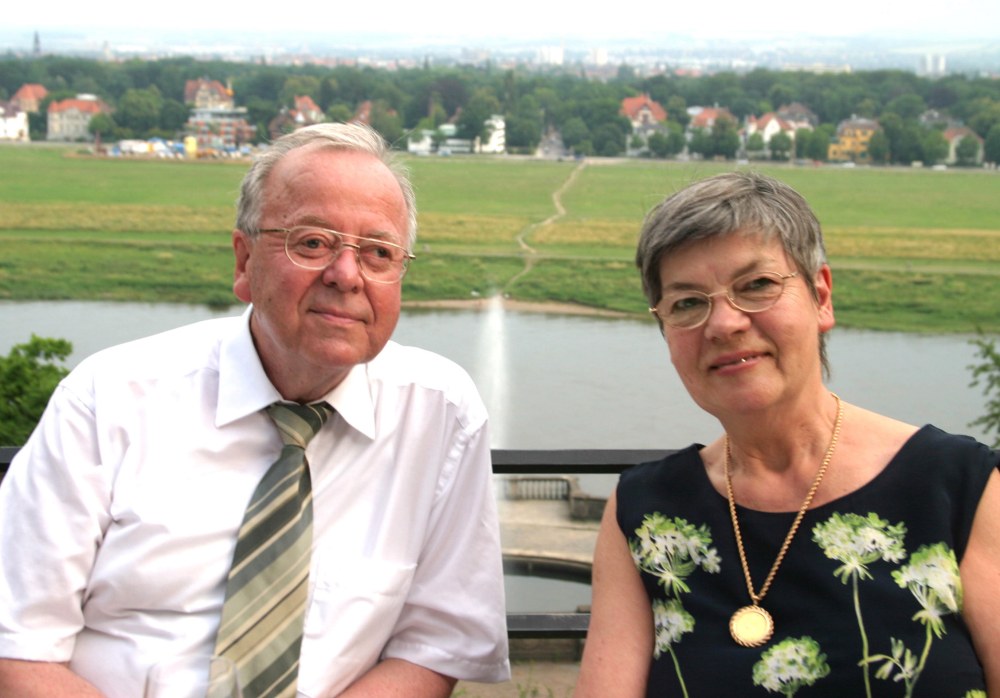
Christine and Wolfgang Uhlmann
Some years ago, grandmasters aged 75 or older met in Dresden. Some of your colleagues, like Lothar Schmid, Mark Taimanov or Evgeni Vasiukov, are dead by now. How much do you miss these meetings?
Yes, it is a pity that these meetings no longer take place. The organizer and sponsor has now moved away from chess and turned more to music. His wife is a very good pianist and he accompanies her to all the concerts. But we are still in touch.
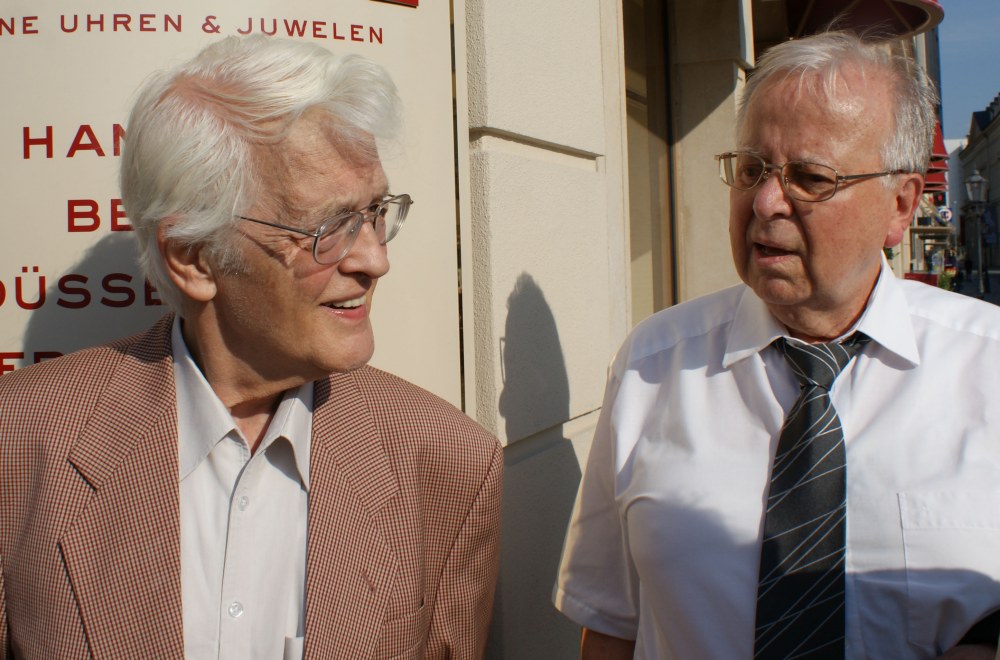
Lothar Schmid and Wolfgang Uhlmann
How did your family celebrate your birthday?
Different than I thought. Unfortunately we had to uninvite friends and acquaintances. Only my children came, but only very briefly to congratulate us. They are very consistent and cautious, they stick to the rules. My daughter is a doctor. Just imagine — she was just in New Zealand and left the country one day before the flight ban. We are all very happy about that.
So we’ve come full circle, Wolfgang. Hardly anyone can avoid the most burning issue these days. We are all affected in the truest sense of the word.
You said it. I very much hope that a vaccine will be found as soon as possible.
Thanks for the interview, and all the best!

Wolfgang Uhlmann at home
Uhlmann vs. Botvinnik, Varna 1962
Queen’s Indian E13
The veteran played his most famous game at the 1962 Chess Olympiad in Bulgaria.
1.d4 Nf6 2.c4 e6 3.Nf3 b6 4.Nc3 Bb7 5.Bg5 h6 6.Bh4 g5 7.Bg3 Nh5 8.e3 Nxg3 9.hxg3 Bg7 10.Qc2 Nc6 11.a3 Qe7 12.0-0-0 g4 13.Nh4 a6 14.Kb1 h5 15.Be2 Rh6 16.f3 0-0-0 17.d5 Na7 18.Na4 gxf3 19.gxf3 d6 20.Ng2 Rdh8 21.e4 Kb8 22.Rd3 Re8 23.Re1 Bh8 24.Qd2 Rg6 25.g4 hxg4 26.fxg4 Be5 27.Rb3 Rh8 28.Qe3 Qg5?
Necessary was 28...Nc8. Wolfgang Uhlmann, who had only one minute for 12 moves before the time control, now executed the decisive tactical blow.
29.Nxb6! Qxe3 30.Nd7+ Kc8 31.Nxe3 Kxd7 32.Rxb7 Bd4 33.Bd1 Bb6 34.Ba4+ Kc8 35.Bc6 Rh3?
Black needed to play 35…Rgh8! and force an exchange of rooks.
36.Nc2 a5 37.Rf1 Nxc6 38.dxc6 Rg7 39.b4 a4 40.e5! Rb3+ 41.Kc1 Rd3 42.Rd1 Rxd1+ 43.Kxd1 Bg1 44.exd6 cxd6 45.b5! Bc5 46.Nb4 Bxb4 47.axb4 Rxg4 48.b6
1-0. An extremely rare final position. The doubled pair of pawns on the b and c-files guarantees a quick mating attack. (W. Uhlmann)